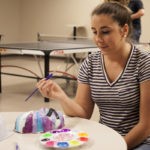3 BENEFITS OF ART THERAPY
Adventure and expressive therapies have grown into extremely beneficial and popular programs at Cumberland Heights. Unlike traditional talk therapy, these treatment practices use movements, activities, actions and multiple venues of expression to help individuals in their healing process.In recent years art therapy has been one of Cumberland Heights’ fastest growing forms of expressive therapy. Art therapy is a type of expressive therapy which utilizes artistic expression to process thoughts and feelings. It’s especially useful for people in addiction treatment.
“Art therapy can be a great way for a person to work through their experiences, emotions and issues which led to and worsened their addiction,” said Rebecca Sledge, LPC-MHSP, ATR.
Sledge, Cumberland Heights Clinical Coordinator of Expressive Therapy and Art Therapist, recently shared these benefits with us.
Rebecca Sledge’s 3 Benefits of Art Therapy;
- NO TALKING NECESSARY
- IMPROVES SELF-ESTEEM
- LEARN A NEW SKILL (OR RECOVER AN OLD ONE)
Art therapy offers a safe alternative to communicate feelings without using conversational methods. It bypasses verbal defense mechanisms and implements therapy from a unique approach. Patients explore powerlessness through non-verbal activity, encouraging them to use the creative process to externalize what it feels like to be out of control in active addiction. This helps remove shame by seeing the disease as something separate of self.
“The first thing I tell patients is art therapy is an outlet to get out of their heads and try things differently,” said Sledge. “I notice with many patients art gives them a visual for something they may not fully understand. It provides some way to ‘move out’ those feelings and emotions they keep bottled up.”
Art, and other expressive therapies, offer a creative outlet to express a wide range of emotions as well as providing a cathartic experience for patients. It helps boost self-esteem by providing a sense of accomplishment, especially for patients with self-criticism, judgement and shame issues. Art therapy provides something tangible for a patient to walk away with while being connected with their body and mind.
“I feel that I am a fuller, more connected person as a result of my time in art therapy,” said Brent L. “Your art classes were some of the most healing and insightful experiences for me.”
The setting for art therapy at Cumberland Heights is a relaxed, open-minded environment for patients to express themselves during the 12-Step treatment process. This helps make art approachable for everyone who is willing to try it.
People with more artistic backgrounds have a tougher time judging their work. They get stuck in the technical parts of art-making and have a difficult time creating without overthinking.
“In active addiction I lost my passion for creativity,” said Jenny P. “You’ve helped bring that back out in me.”
For those new to the creative process, art therapy teaches them a skill and provides a sense of accomplishment, especially for patients with a lot of self-criticism and shame.
“For our patients, being able to complete a project and walk out with a piece of art gives them a sense of pride,” said Sledge. “Patients learning this and leaving with something tangible is a great tool for lifelong recovery.”











